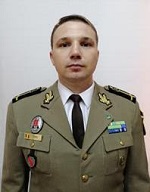THE IMPORTANCE OF MISSION ANALYSIS IN MODERN MILITARY OPERATIONS
DOI:
https://doi.org/10.53477/2668-2028-21-08Keywords:
Keywords: conflict; planning; mission; analysis; operational environment; understand.Abstract
Abstract: The complexity of today’s operational environment has a direct impact on the military instrument of power of every nation. Nowadays, conflicts have a much bigger unconventional component. This component lies in the types of actors involved and the methods used by them. Most contemporary conflicts are no longer classic confrontations between two states that use their military constituent to impose their will on the adversary. Today, the other instruments of power play an equally important role. The resolution of today's conflicts does not only require a military approach to the problem, which further complicates the mission of the military forces, as they are forced to focus on other areas outside the military. Today, non-state actors play a much more important role in armed conflicts. They often fail to comply with international conventions on armed conflict and use any means available to achieve their own goals. In addition, the unprecedented technological development of society in general, but also the unrestricted access to these types of technologies further facilitates the use of unconventional methods by malicious non-state actors in support of their own interests. Therefore, it can be seen that, nowadays, the complexity of armed conflicts has increased exponentially, and the identification and understanding of the problem, the causes of conflicts, as well as the ways to resolve it have become increasingly difficult to achieve. In this regard, I believe that the military should develop appropriate procedures to support the correct understanding of what needs to be done to achieve success and to insist on optimizing the mission analysis as part of the military operations planning process, analysis that should develop the correct understanding of the situation and should support viable future options to solve the conflict.
References
2. ***, ADP 5-0, The Operations Process, US Department of the Army, 2019.
3. ***, JP 5-0, Joint Planning, US Joint Chiefs of Staff, 2020.
4. ***, Strategic Foresight Analysis, NATO Allied Command Transformation, Norfolk, 2017.
5. STANCIU Cristian-Octavian, Implications of modern systems and technologies in redefining new doctrine concepts, Bulletin of “Carol I” National Defence University, no.1, Bucharest, 2015.
6. TZU Sun, The Art of War, Rupa Publications India, New Delphi, 2016.


